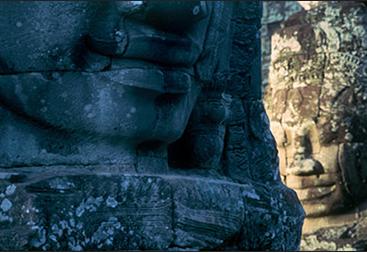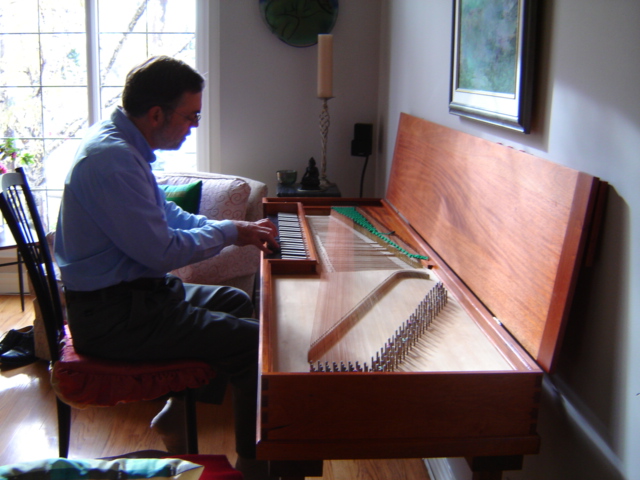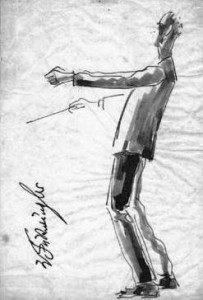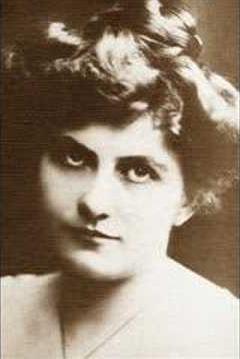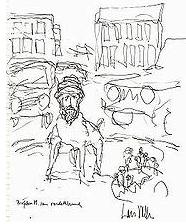Buddhism and Faith
Somerset Maugham: wanting, but not quite able, to believe

In September of 2007 I flew to Phnom Penh to gather material for a new novel. Two of the books I brought with me were by Maugham: a first edition (a gift from Susana Serna) of The Gentleman in the Parlour, a Record of a Journey from Rangoon to Haiphong (1930), which is as its title suggests a travel book, and a Penguin paperback edition of The Summing Up (1938), a collection of valedictory essays.
In both books Maugham devotes a section to the question of evil; that is, how to satisfactorily explain the existence of evil in this world. He goes through the standard Christian and other philosophical arguments and finds them wanting. Then he discusses Buddhism. I find his essays so interesting that I have included the last few paragraphs of both below. Regarding his style, Maugham himself wrote that, given his natural limitations as a writer, he decided that he should aim at lucidity, simplicity and euphony. I find his style powerful, but not as simple as it appeared in 1938.
From The Gentleman in the Parlour
While reading Bradley’s Appearance and Reality, Maugham is repelled at the author’s explanation of evil:
‘But when I came upon his treatment of the problem of evil I found myself scandalized. The Absolute, I read, is perfect, and evil, being but an appearance, cannot but subserve to the perfection of the whole. Error contributes to greater energy of life. Evil plays a part in a higher end and in this sense unknowingly is good. The absolute is the richer for every discord.
And my memory brought back to me, I know not why, a scene at the beginning of the war. It was in October and our sensibilities were not yet blunted. A cold raw night. There had been what those who took part in it thought a battle, but which was so insignificant a skirmish that the papers did not so much as refer to it, and about a thousand men had been killed and wounded. They lay on straw on the floor of a country church, and the only light came from the candles on the altar. The Germans were advancing and it was necessary to evacuate them as quickly as possible. All through the night the ambulance cars, without lights, drove back and forth, and the wounded cried out to be taken, and some died as they were being lifted on to the stretchers and were thrown on the heap of dead outside the door, and they were dirty and gory, and the church stank of blood and the rankness of humanity.
And there was one boy who was so shattered that it was not worth while to move him and as he lay there, seeing men on either side of him being taken out, he screamed at the top of his voice: je ne veux pas mourir. Je suis trop jeune. Je ne veux pas mourir. And he went on screaming that he did not want to die till he died.
Of course this is no argument. It was but an inconsiderable incident the only significance of which was that I saw it with my own eyes and in my ears for days afterwards rang that despairing cry, but a greater than I, a philosopher and a mathematician into the bargain if your please, said that the heart had its reasons which the head did not know, and (in the grip of compound things, to use the Buddhist phrase, as I am) this scene is to me a sufficient refutation of the metaphysician’s fine-spun theories. But my heart can accept the evils that befall me if they are the consequence of actions that I (the I that is not my soul, which perishes, but the result of my deeds in another state of existence) did in past time, and I am resigned to the evils that I see about me, the death of the young, (the most bitter of all) the grief of the mothers that bore them in anguish, poverty and sickness and frustrated hopes, if these evils are but the consequence of the sins which those that suffer them once committed.
Here is an explanation that outrages neither the heart nor the head; there is only one fault that I can find in it: it is incredible.’
From The Summing Up
Again at the end of a later essay on the existence of evil, Maugham is appalled at how devoid of reasonable explanation are the philosophers and theologians:
‘Evils are there, omnipresent; pain and disease, the death of those we love, poverty, crime, sin, frustrated hope: the list is interminable. What explanations have the philosophers to offer? Some say the evil is logically necessary so that we may know good; some say that by the nature of the world there is an opposition between good and evil and that each is metaphysically necessary to the other. What explanations do the theologians have to offer? Some say that God has placed evils here for our training; some say that he has sent them upon men to punish them for their sins.
But I have seen a child die of meningitis. I have only found one explanation that appealed equally to my sensibility and to my imagination. This is the doctrine of the transmigration of souls. As everyone knows, it assumes that life does not begin at birth or end at death, but is a link in an indefinite series of lives each one of which is determined by the acts done in previous existences. Good deeds may exalt a man to the heights of heaven and evil deeds degrade him to the depths of hell. All lives come to an end, even the life of of the gods, and happiness is to be sought in release from the round of births and repose in the changeless state called Nirvana. It would be less difficult to bear the evils of one’s own life if one could think that they were but the necessary outcome of one’s errors in a previous existence, and the effort to do better would be less difficult too when there was the hope that in another existence a greater happiness would reward one.
But if one feels one’s own woes in a more forcible way than those of others (I cannot feel your toothache, as the philosophers say) it is the woes of others that arouse one’s indignation. It is possible to achieve resignation in regard to one’s own, but only philosophers obsessed with the perfection of the Absolute can look upon those of others, which seem so often unmerited, with an equal mind.
If Karma were true one could look upon them with pity, 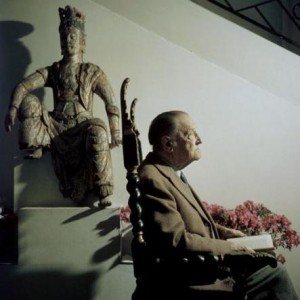 but with fortitude. Revulsion would be out of place and life would be robbed of the meaningless of pain which is pessimism’s unanswer
but with fortitude. Revulsion would be out of place and life would be robbed of the meaningless of pain which is pessimism’s unanswer
-ed argument. I can only regret that I find the doctrine impossible to believe.’

